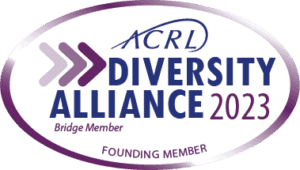The University of Iowa Libraries is committed to the principles of inclusion, diversity, equity, accessibility, and social justice (IDEAS). We recognize the legacy of inequity and oppression for those holding historically marginalized identities and pledge to counter those legacies through our organizational mission and strategic priorities. We draw from the American Library Association’s Key Action Areas and Code of Ethics. We are dedicated to the ongoing work of combatting racism, hate, and discrimination and believe it is each person’s responsibility to work towards removing barriers in order for everyone to succeed.
To fulfill this commitment, we strive to:
- Provide a safe, equitable, and inclusive environment
- Promote student success through outreach and instruction
- Develop inclusive collections, programs, and services
- Recruit and retain a more diverse staff
- Facilitate Libraries’ staff IDEAS development
- Collaborate with campus constituents in Diversity, Equity, and Inclusion (DEI) efforts
Diversity Initiatives Within the UI Libraries
UI Libraries Anti-Racism Guide — As a research library, we have a responsibility to share and promote public access to important information about anti-racism, which we’ve made available in this anti-racism subject guide. Libraries staff update this guide continually.
ACRL Diversity Alliance — The UI Libraries is a charter member of the Association of College Research Libraries (ACRL) Diversity Alliance, an organization that unites academic libraries that share a commitment to increase the hiring pipeline of qualified, talented individuals from underrepresented racial and ethnic groups.

As a member of this Alliance, the UI Libraries has:
- Established a residency program for at least one individual that lasts a minimum of two years (three years preferred).
- Committed to designing experiences at the local level to expand the residents’ interests and skills (e.g., mentorships, rotation through other Libraries units, etc.)
- Agreed to serve as a resource, i.e., advisors and guides, to those institutions participating in the ACRL Diversity Alliance.
- Provided at a minimum the same level of professional development support provided other Libraries faculty/staff/employees.
- Provided a salary for the resident commensurate with the salaries of equivalent entry-level library professionals.
Staff Development & Diversity Program Team — The UI values diversity among students, faculty, and staff and believes that a rich diversity of people serve to enhance the quality of the educational experience at the UI. This belief is guided by three foundational commitments and seven core values that direct planning, setting priorities, and “carrying out every aspect of its [the university’s] mission.” Diversity, a core value, and inclusion, a foundational commitment, are two of these directives. We therefore seek to expand our awareness and understanding of the diversity of our community and promote inclusion – within the Libraries’, the university, and beyond.
This team advises the coordinator of staff development and diversity programming on the development of programs for Libraries’ staff. Specifically, the team identifies, recommends, promotes, and assists in the delivery of programs for all Libraries’ staff that will:
- expand their awareness of diversity issues;
- expand their awareness of relevant services, faculty scholarship, and university initiatives taking place at the UI;
- expand their awareness of trends and issues in librarianship;
- expand their supervisory, managerial, and leadership skills;
- support and expand their awareness of wellness, safety, financial health, and other, similar university goals.
Additional initiatives include:
- Creation of the Inclusion, Diversity, Equity, Accessibility, and Social Justice (IDEAS) Council, charged with ensuring and furthering the commitment of the Libraries staff and leadership to those principles.
- Addition of a director for Diversity, Equity, Accessibility, and Inclusion as part of the Libraries’ Leadership Team.
- Sessions arranged by the Staff Development and Diversity Programming Team that allow staff to engage with IDEAS concepts.
- Ongoing professional development requirement since 2008 for Libraries staff, including an annual minimum of two diversity-related opportunities.
- Inclusive spaces, including lactation rooms, reflection rooms, and silent study space at both the Main and Hardin Libraries.
- Caption and transcription of audio and video materials, prioritized since 2018.
- Training for search committees on interviewing, anti-bias, and targeted recruitment to increase the diversity of candidate pools.
- Support to cultural centers by liaison librarians.
- Programming, events, and exhibits that focus on underrepresented groups.
- Promotion of more equitable and inclusive language in subject vocabularies by a dedicated Assessing DEAI in Subject Terms team.
- Collaborative development of information guides with the Division of Diversity, Equity, and Inclusion.
- Universal design standards used in the development of gallery exhibits, with integration of inclusive technology, such as a hearing loop in the gallery and an immersive reader feature included in virtual exhibits.
